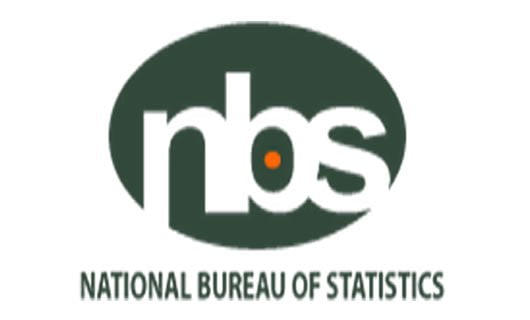The National Bureau of Statistics says Nigeria’s headline inflation rate increased to 21.91 per cent on a year-on-year basis in February 2023.
This is according to the NBS Consumer Price Index and Inflation Report for February 2023 released on Wednesday.
According to the report, the figure is 6.21 per cent points higher compared to the 15.70 per cent recorded in February 2022.
It said on a month-on-month basis, the headline inflation rate in February 2023 was 0.09 per cent higher than the rate recorded in January 2023 at 21.82 per cent.

The report said the increase in the inflation rate was largely attributed to the rise in Bread and Cereal at 21.67 per cent.
It said: “Actual and Imputed Rent at 7.74 per cent, potatoes, yam and other tubers at 6.06 per cent, vegetables at 5.44 per cent, and meat at 4.78 per cent.”
The percentage change in the All-Items Index in February 2023 was 1.71 per cent on a month-on-month basis.
The report added: “This indicates a 0.16 per cent decrease compared to the 1.87 per cent recorded in January 2023.
“This means that in February 2023, on average, the general price level was 0.16 per cent lower relative to January 2023.”
It said the percentage change in the average CPI for the 12 months ending February 2023 over the average of the CPI for the previous 12 months period was 19.87 per cent.
“This indicates a 3.15per cent increase compared to the 16.73 per cent recorded in February 2022,” it added.
It said increases were recorded in all Classification of Individual Consumption by Purpose (COICOP) divisions that yielded the headline index.
The report said the food inflation rate in February 2023 was 24.35 per cent on a year-on-year basis, which was 7.24 per cent higher compared to the rate recorded in February 2022 at 17.11 per cent.
“The rise in food inflation is caused by increases in prices of bread and cereals, potatoes, yams and other tubers, and oil and fat, fish, vegetable, fruits, meat, and food products,” it said.
The report said on a month-on-month basis, the food inflation rate in February was 1.90 per cent, which was a 0.18 per cent drop compared to the rate recorded in January 2023 at 2.08 per cent.
The report said “All items less farm produce” or Core inflation, which excludes the prices of volatile agricultural produce stood at 18.84 per cent in February 2023 on a year-on-year basis.
“This increased by 4.83 per cent compared to 14.01 per cent recorded in February 2022,” it said.
On a month-on-month basis, the core inflation rate was 1.06 per cent in February 2023, which was a 0.76 per cent drop compared to what it stood at in January 2023 at 1.82 per cent.
According to the report, the highest increases were recorded in prices of gas, passenger transport by Air, liquid fuel, fuels, and lubricants for personal transport equipment, vehicles spare parts, and solid fuel, among others.
It said: “The average 12-month annual inflation rate was 16.92 per cent for the 12 months ending February 2023, this was 3.46 per cent points higher than the 13.46 per cent recorded in February 2022.”
The report said on a year-on-year basis in February 2023, the urban inflation rate was 22.78 per cent, which was 6.53 per cent higher compared to the 16.25 per cent recorded in February 2022.
It said: “On a month-on-month basis, the urban inflation rate was 1.85 per cent in February 2023, representing a 0.13 per cent decrease compared to January 2023 at 1.98 per cent.”
It said the corresponding 12-month average for the urban inflation rate was 20.45 per cent in February 2023.
The report said: “This was 3.16 per cent higher compared to the 17.29 per cent reported in February 2022.”
The report said on a year-on-year basis in February 2023, the rural inflation rate was 21.10 per cent, which was 5.92 per cent higher compared to the 15.18 per cent recorded in February 2022.
“On a month-on-month basis, the rural inflation rate in February 2023 was 1.58 per cent, which decreased by 0.19 per cent compared to January 2023 at 1.77 per cent,” it said.
It said the corresponding 12-month average for the rural inflation rate in February 2023 was 19.33 per cent, which was 3.15 per cent higher compared to the 16.18 per cent recorded in February 2022.
On states’ profile analysis, the report showed in February 2023, all items inflation rate on a year-on-year basis was highest in Bauchi at 24.59 per cent, followed by Rivers at 24.40 per cent, and Ondo at 24.27 per cent.
It, however, said the slowest rise in headline year-on-year inflation was recorded in Sokoto at 18.90 per cent, followed by Borno at 18.94 per cent, and Cross River at 19.62 per cent.
The report, however, said in February 2023, all items inflation rate on a month-on-month basis was highest in Edo at 2.76 per cent, Ogun at 2.64 per cent and Yobe at 2.36 per cent.
It added: “Bayelsa at 0.74 per cent followed by Borno at 0.95 per cent and Taraba at 1.03 per cent recorded the slowest rise in month-on-month inflation.”
The report said food inflation in February 2023, on a year-on-year basis, was highest in Kwara at 29.51 per cent, followed by Imo at 27.47 per cent, and Lagos at 27.42 per cent.
“Sokoto at 18.54 per cent, followed by Jigawa at 19.67 per cent and Yobe at 21.89 per cent recorded the slowest rise on year-on-year food inflation,” it said.
The report, however, said on a month-on-month basis, February 2023 food inflation was highest in Yobe at 3.15 per cent, followed by Edo at 3.03 per cent, and Ogun at 2.90 per cent.
“With Rivers at 0.75 per cent, followed by Sokoto at 0.89 per cent and Nasarawa at 0.90 per cent recorded the slowest rise on month-on-month inflation,” it said.

